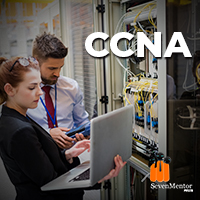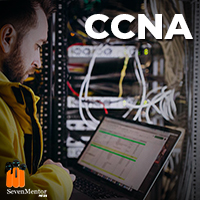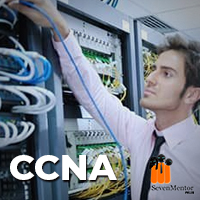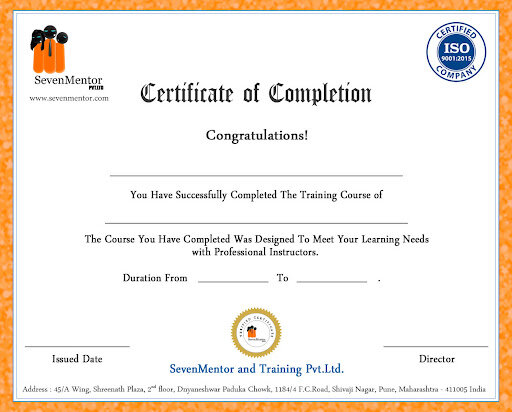CCNA
The era of technology and networking to acquire the comfort zone. The company Cisco Systems provides the CCNA Course in Jabalpur which is well-known among computer network engineers.
Call The Trainer
Batch Timing
- Regular: 2 Batches
- Weekends: 2 Batches
Request Call Back
Class Room & Online Training Quotation
About CCNA
Network administrators, network support engineers, and network specialists are all included in its scope of application. Learning about various networking concepts, such as IP addressing, OSI models, network security, etc., is helpful.
More than 1 million CCNA training in Jabalpur certifications is believed to have been distributed since the certification's initial release in 1998. "Cisco Certified Network Associate" is an acronym for this. The CCNA certification covers a wide range of networking concepts and CCNA foundations. Candidates should study the CCNA classes in Jabalpur tenets and get ready to work with the most recent network technology. Believe and surprise your learning experience with bags of success.
A Special Learning Community is Here for You
The Cisco Learning Network is the first to leverage a social network as a popular learning platform. This community makes use of wikis, blogging, collaboration, document sharing, and other Web 2.0 features. The network provides a vast array of services, including mentorship, simulation labs, roadmaps, corporate internships, job postings, staff recruiting, and employee referrals. Cisco Learning Network was developed for anyone interested in a career in networking, regardless of their level of education or experience.
Scope of the CCNA
All industries are on the lookout for somebody who can manage the networking infrastructure. This is where the CCNA Course in Jabalpur comes into play. A candidate can gain all the necessary information and skills for networking through the CCNA training in Jabalpur.
Multiply the chances of learning and gaining knowledge to acquire interesting career opportunities.
Candidates who are familiar with the CCNA classes in Jabalpur certification can work in a variety of positions in both the public and commercial sectors, earning lucrative salaries. Demand for CCNA professionals has significantly increased with the arrival of technological innovation and the need for skilled software developers and network administrators.
What is the benefit of earning a CCNA certification?
The credential attests to a professional's expertise in medium-level switched and routed networks, including how to operate, configure, and troubleshoot them. Additionally covered are the setting up and testing of WAN-based connections at far-off sites.
It gives the applicant instructions on how to create a point-to-point network.
It demonstrates how to meet user requirements by determining the network topology.
It outlines the steps to take to link networks using routing protocols.
It explains the process for creating network addresses.
The certificate holder can set up, manage, and operate LAN and WAN services for small networks.
The CCNA certificate is also accepted for various other Cisco certifications, including CCNA Security, CCNA Wireless, CCNA Voice, etc.
SevenMentor Institute offers a wide variety of technical training among which the CCNA Course in Jabalpur is one of the successive networking courses.
A beneficial course is CCNA to design your career.
Why Earning a CCNA Certification Is Important for Your IT Career
Many organizations employ Cisco products and services on a global scale. That suggests there is a demand for IT specialists who are familiar with and adept at working with Cisco systems. For many IT professionals, getting certified starts with the CCNA credential. In actuality, it is the most widely used certification worldwide. It provided evidence that you are familiar with Cisco technology and networking principles.
There are six domains in the Cisco CCNA 200-301 test topics. The CCNA 200-301 test, which lasts 120 minutes, is designed to ensure that you have a firm grasp of certain essential concepts: IP connectivity and services, Automation, and Programmability.
Earn sufficient knowledge by learning networking notions.
CCNA Certification: Why Get One?
Several certifications are available to you if you wish to operate in the field of computer networking professionally. To land your ideal career and advance your technical skills, you must obtain these certificates. Professionals must incorporate new or updated information because the IT industry is currently competing on a global scale.
Obtaining CCNA certification is a smart move to take advantage of the opportunity to advance your career in the Hardware and Networking business if you are now employed as a software specialist and also involved in the networking industry.
With this certification, you have a modern, in-depth understanding of the current employment market.
For a candidate to successfully advance their profession in networking, learning from a reputable and successful training facility like SevenMentor Institute will be a tremendous accomplishment.
A trajectory to gain the mode of transmission.
Different industries' IT experts are allowed to share their opinions and ideas about the challenges they face as well as suggestions for how to overcome them. The CCNA certification can increase your value to the company, as well as your ability to get a raise and endorsement preference. The Cisco Certified Network Associates are qualified for a range of IT positions, including those of network administrator, network support specialist, and system analyst.
For other high-level Cisco qualifications, the Cisco certification is the most significant stepping stone. Providing professionals with knowledge in transitional networking is the main goal of this certification.
CCNA Course yields
Expertise
Earning the CCNA certification will increase your expertise much like obtaining any higher-level IT certification. Your understanding of Cisco networking and understanding of how it functions will improve along with your CCNA certification. Your career will greatly benefit from this knowledge.
Benefits to the organization
Knowing the latest trends and technologies will aid your organization as well as your career because it will make you more marketable. Employing Cisco-certified individuals will result in significant savings for the organizations on Cisco goods.
Outstanding Career Possibilities
The networking sector offers a wide range of opportunities for career progression, regardless of where you are in your career. As technology advances daily, more jobs for competent people are needed by businesses and agencies.
Trending aspect that enhances the magnificence of technology.
What profits, CCNA?
Candidates can gain a greater comprehension of fundamental IT concepts by earning a Cisco CCNA certification. They support networking professionals in updating their skills and expertise while keeping up with the growth of new sectors. A candidate's résumé will look fantastic with the CCNA certification, and it will help them land paid interviews and jobs. They receive specialized training after being employed and receive qualifications that will advance their professions. Increased pay is a result of promotions and additional employment prospects.
Obtain a job in a successive organization using CCNA credentials.
The initial step towards a higher Cisco certification is CCNA associate certification. The Cisco Certified Networking Professional (CCNP) set of professional credentials is the next option. Cloud, wireless, switching, routing, and collaboration are all included. The Cisco Certified Internet Expert (CCIE) program comes after that series.
Online Classes
The online CCNA course in Jabalpur at SevenMentor & Training Pvt. Ltd. is one example of a specialized course certification that students and applicants can maintain successfully. SevenMentor & Training Pvt. Ltd. provides high-quality online courses. Our professors keep an eye on each student's development. The online CCNA classes in Jabalpur provided in-depth teaching on our technology, software, and networking issues. In both our examinations and the application of it, we will succeed. The placement cell successfully places students in rewarding businesses.
Course Eligibility
CCNA is an associate or entry-level certification exam for those who are planning to build their career in the most demanding field of networking.
- 10+2 students can go for CCNA Training
- Undergraduates and graduates
- Professionals who want switch
- Those who are interested in Networking
Syllabus of CCNA
Cisco Certified Network Associate (200-301)
Exam Description: The Cisco Certified Network Associate (CCNA) Routing
and Switching composite exam (200-301) is a 90-minute, 50–60 question
assessment that is associated with the CCNA Routing and Switching
certification. This exam tests a candidate's knowledge and skills related to
network fundamentals, LAN switching technologies, IPv4 and IPv6 routing
technologies, WAN technologies, infrastructure services, infrastructure
security, and infrastructure management .The following topics are general guidelines for the content likely to be
included on the exam. However, other related topics may also appear on any
specific delivery of the exam. In order to better reflect the contents of the
exam and for clarity purposes, the guidelines below may change at any time
without notice.
15% 1.0 Network Fundamentals
21% 2.0 LAN Switching Technologies
23% 3.0 Routing Technologies
10% 4.0 WAN Technologies
10% 5.0 Infrastructure Services
11% 6.0 Infrastructure Security
10% 7.0 Infrastructure Management
- 1.0 Network Fundamentals
- 1.1. Compare and contrast OSI and TCP/IP models
- 1.2. Compare and contrast TCP and UDP protocols
- 1.3. Describe the impact of infrastructure components in an enterprise network
- 1.3.1. Firewalls
- 1.3.2. Access points
- 1.3.3. Wireless controllers
- 1.4. Describe the effects of cloud resources on enterprise network architecture
- 1.4.1. Traffic path to internal and external cloud services
- 1.4.2. Virtual services
- 1.4.3. Basic virtual network infrastructure
- 1.5. Compare and contrast collapsed core and three-tier architectures
- 1.6. Compare and contrast network topologies
- 1.6.1. Star
- 1.6.2. Mesh
- 1.6.3. Hybrid
- 1.7. Select the appropriate cabling type based on implementation requirements
- 1.8. Apply troubleshooting methodologies to resolve problems
- 1.8.1. Perform and document fault isolation
- 1.8.2. Resolve or escalate
- 1.8.3. Verify and monitor resolution
- 1.9. Configure, verify, and troubleshoot IPv4 addressing and subnetting
- 1.10. Compare and contrast IPv4 address types
- 1.10.1. Unicast
- 1.10.2. Broadcast
- 1.10.3. Multicast
- 1.11. Describe the need for private IPv4 addressing
- 1.12. Identify the appropriate IPv6 addressing scheme to satisfy< addressing requirements in a LAN/WAN environment
- 1.13. Configure, verify, and troubleshoot IPv6 addressing
- 1.14. Configure and verify IPv6 Stateless Address Auto Configuration
- 1.15. Compare and contrast IPv6 address types
- 1.15.1. Global unicast
- 1.15.2. Unique local
- 1.15.3. Link local
- 1.15.4. Multicast
- 1.15.5. Modified EUI 64
- 1.15.6. Autoconfiguration
- 1.15.7. Anycast
- LAN Switching Technologies
- 2.1. Describe and verify switching concepts
- 2.1.1. MAC learning and aging
- 2.1.2. Frame switching
- 2.1.3. Frame flooding
- 2.1.4. MAC address table
- 2.2. Interpret Ethernet frame format
- 2.3. Troubleshoot interface and cable issues (collisions, errors, duplex, speed)
- 2.4. Configure, verify, and troubleshoot VLANs (normal/extended range) spanning multiple switches
- 2.4.1. Access ports (data and voice)
- 2.4.2. Default VLAN
- 2.5. Configure, verify, and troubleshoot interswitch connectivity
- 2.5.1. Trunk ports
- 2.5.2. Add and remove VLANs on a trunk
- 2.5.3. DTP, VTP (v1&v2), and 802.1Q
- 2.5.4. Native VLAN
- 2.6. Configure, verify, and troubleshoot STP protocols
- 2.6.1. STP mode (PVST+ and RPVST+)
- 2.6.2. STP root bridge selection
- 2.7. Configure, verify and troubleshoot STP related optional features
- 2.7.1. PortFast
- 2.7.2. BPDU guard
- 2.8. Configure and verify Layer 2 protocols
- 2.8.1. Cisco Discovery Protocol
- 2.8.2. LLDP
- 2.9. Configure, verify, and troubleshoot (Layer 2/Layer 3) EtherChannel
- 2.9.1. Static
- 2.9.2. PAGP
- 2.9.3. LACP
- 2.10. Describe the benefits of switch stacking and chassis aggregation
- 3.0 Routing Technologies
- 3.1. Describe the routing concepts
- 3.1.1. Packet handling along the path through a network
- 3.1.2. Forwarding decision based on route lookup
- 3.1.3. Frame rewrite
- 3.2. Interpret the components of a routing table
- 3.2.1. Prefix
- 3.2.2. Network mask
- 3.2.3. Next hop
- 3.2.4. Routing protocol code
- 3.2.5. Administrative distance
- 3.2.6. Metric
- 3.2.7. Gateway of last resort
- 3.3. Describe how a routing table is populated by different routing information sources
- 3.3.1. Admin distance
- 3.4. Configure, verify, and troubleshoot inter-VLAN routing
- 3.4.1. Router on a stick
- 3.4.2. SVI
- 3.5. Compare and contrast static routing & dynamic routing
- 3.6. Compare and contrast distance vector and link state routing protocols
- 3.7. Compare and contrast interior and exterior routing protocols
- 3.8. Configure, verify, and troubleshoot IPv4 and IPv6 static routing
- 3.8.1. Default route
- 3.8.2. Network route
- 3.8.3. Host route
- 3.8.4. Floating static
- 3.9. Configure, verify, and troubleshoot single area and multi-area OSPFv2 for IPv4 (excluding authentication, filtering, manual summarization, redistribution, stub, virtual-link, and LSAs)
- 3.10. Configure, verify, and troubleshoot single area and multi-area OSPFv3 for IPv6 (excluding authentication, filtering, manual summarization, redistribution, stub, virtual-link, and LSAs)
- 3.11. Configure, verify, and troubleshoot EIGRP for IPv4 (excluding authentication, filtering, manual summarization redistribution, stub)
- 3.12. Configure, verify, and troubleshoot EIGRP for IPv6 (excluding authentication, filtering, manual summarization redistribution, stub)
- 3.13. Configure, verify, and troubleshoot RIPv2 for Ipv4 (excluding authentication, filtering manual summarization, redistribution)
- 3.14. Troubleshoot basic Layer 3 end-to-end connectivity issues
- 4.0 WAN Technologies
- 4.1. Configure and verify PPP and MLPPP on WAN interfaces using local authentication
- 4.2. Configure, verify, and troubleshoot PPPoE client-side interfaces using local authentication
- 4.3. Configure, verify, and troubleshoot GRE tunnel connectivity
- 4.4. Describe WAN topology options
- 4.4.1. Point-to-point
- 4.4.2. Hub and spoke
- 4.4.3. Full mesh
- 4.4.4. Single vs dual-homed
- 4.5. Describe WAN access connectivity options
- 4.5.1. MPLS
- 4.5.2. Metro Ethernet
- 4.5.3. Broadband PPPoE
- 4.5.4. Internet VPN (DMVPN, site-to-site VPN, client VPN)
- 4.6. Configure and verify single-homed branch connectivity using eBGP IPv4 (limited to peering and route advertisement using Network command only)
- 4.7. Describe basic QoS concepts
- 4.7.1. Marking
- 4.7.2. Device trust
- 4.7.3. Prioritization
- A. Voice
- B. Video
- C. Data
- 4.7.4. Shaping
- 4.7.5. Policing
- 4.7.6. Congestion management
- 5.0 Infrastructure Services
- 5.1. Describe DNS lookup operation
- 5.2. Troubleshoot client connectivity issues involving DNS
- 5.3. Configure and verify DHCP on a router (excluding static reservations)
- 5.3.1. Server
- 5.3.2. Relay
- 5.3.3. Client
- 5.3.4. TFTP, DNS, and gateway options
- 5.4. Troubleshoot client- and router-based DHCP connectivity issues
- 5.5. Configure, verify, and troubleshoot basic HSRP
- 5.5.1. Priority
- 5.5.2. Preemption
- 5.5.3. Version
- 5.6. Configure, verify, and troubleshoot inside source NAT
- 5.6.1. Static
- 5.6.2. Pool
- 5.6.3. PAT
- 5.7. Configure and verify NTP operating in a client/server mode
- 6.0 Infrastructure Security
- 6.1. Configure, verify, and troubleshoot port security
- 6.1.1. Static
- 6.1.2. Dynamic
- 6.1.3. Sticky
- 6.1.4. Max MAC addresses
- 6.1.5. Violation actions
- 6.1.6. Err-disable recovery
- 6.2. Describe common access layer threat mitigation techniques
- 6.2.1. 802.1x
- 6.2.2. DHCP snooping
- 6.2.3. Nondefault native VLAN
- 6.3. Configure, verify, and troubleshoot IPv4 and IPv6 access list for traffic filtering
- 6.3.1. Standard
- 6.3.2. Extended
- 6.3.3. Named
- 6.4. Verify ACLs using the APIC-EM Path Trace ACL Analysis tool
- 6.5. Configure, verify, and troubleshoot basic device hardening
- 6.5.1. Local authentication
- 6.5.2. Secure password
- 6.5.3. Access to device
- A. Source address
- B. Telnet/SSH
- 6.5.4. Login banner
- 6.5.5. Describe device security using AAA with TACACS+ and RADIUS
- 7.1. Configure and verify device-monitoring protocols
- 7.1.1. SNMPv2
- 7.1.2. SNMPv3
- 7.1.3. Syslog
- 7.2. Troubleshoot network connectivity issues using ICMP echo-based IP SLA
- 7.3. Configure and verify device management
- 7.3.1. Backup and restore device configuration
- 7.3.2. Using Cisco Discovery Protocol or LLDP for device discovery
- 7.3.3. Licensing
- 7.3.4. Logging
- 7.3.5. Timezone
- 7.3.6. Loopback
- 7.4. Configure and verify initial device configuration
- 7.5. Perform device maintenance
- 7.5.1. Cisco IOS upgrades and recovery (SCP, FTP, TFTP, and MD5 verify)
- 7.5.2. Password recovery and configuration register
- 7.5.3. File system management
- 7.6. Use Cisco IOS tools to troubleshoot and resolve problems
- 7.6.1. Ping and traceroute with extended option
- 7.6.2. Terminal monitor
- 7.6.3. Log events
- 7.6.4. Local SPAN
- 7.7. Describe network programmability in enterprise network architecture
- 7.7.1. Function of a controller
- 7.7.2. Separation of control plane and data plane
- 7.7.3. Northbound and southbound APIs
Trainer Profile of CCNA
At SevenMentor, you can take either online training or classroom training. Aside from this, SevenMentor additionally offers corporate training for associations to upskill their workforce. All mentors at SevenMentor have years of important industry experience, and they have been effectively functioning as advisors in a similar space, which has made them topic specialists. You can have a demo lecture to check the quality of our trainers.
- Certified Professionals with more than 8+ Years of Experience
- Trained more than 2000+ students in a year
- Strong Theoretical & Practical Knowledge in their domains
- Expert level Subject Knowledge and fully up-to-date on real-world industry applications
CCNA Exams & Certification
SevenMentor Certification is Accredited by all major Global Companies around the world. We provide after completion of the theoretical and practical sessions to fresher’s as well as corporate trainees.
Our certification at SevenMentor is accredited worldwide. It increases the value of your resume and you can attain leading job posts with the help of this certification in leading MNC’s of the world. The certification is only provided after successful completion of our training and practical based projects.
Proficiency After Training
- Describe how Components Operate, identifying Important Elements, a function of network Elements, as well as the OSI reference model
- Employing the host-to-host Parcel delivery process, Clarify Problems related to increasing traffic on an Ethernet LAN and identify Changed LAN technology Alternatives into Ethernet networking Problems
- Describe the reasons for Expanding the reach of a LAN as well as the methods Which Can Be Utilized, with a focus on RF wireless Accessibility
- Explain the reasons for Linking networks Using routers and the Way routed networks transmit Information via networks using TCP / IP
- Explain the Use of WANs, the Significant Apparatus of WANs, Also configure PPP encapsulation, static and dynamic routing, PAT, and RIP routing
- Utilize the command-line Port to Detect neighbors on the Community and manage the router startup and Configuration
Key Features
Skill level
From Beginner to Expert
We are providing Training to the needs from Beginners level to Experts level.
Course Duration
12 weeks
Course will be 90 hrs to 110 hrs duration with real-time projects and covers both teaching and practical sessions.
Total Learners
2000+ Learners
We have already finished 100+ Batches with 100% course completion record.
Frequently Asked Questions
Batch Schedule
| DATE | COURSE | TRAINING TYPE | BATCH | CITY | REGISTER |
|---|---|---|---|---|---|
| 30/12/2024 |
CCNA |
Online | Regular Batch (Mon-Sat) | Jabalpur | Book Now |
| 31/12/2024 |
CCNA |
Online | Regular Batch (Mon-Sat) | Jabalpur | Book Now |
| 28/12/2024 |
CCNA |
Online | Weekend Batch (Sat-Sun) | Jabalpur | Book Now |
| 28/12/2024 |
CCNA |
Online | Weekend Batch (Sat-Sun) | Jabalpur | Book Now |
Students Reviews
An important source of information is qualified training personnel. SevenMentor is a fantastic entry with the best possible learning environment. The staff and trainers follow protocols, which I respect.
- Paresh Ahuja
Candidates are encouraged at Sevenmentor to develop their skills. The staff members are helpful. The most effective teachers highlight the essential elements of the course.
- Kiran Dhapte
The candidate may visit the center to receive assistance with their capacity for self-development. The CCNA Course is one of the Sevenmentor Institute of Learning's most popular courses. I listened to the most insightful lectures across a variety of disciplines they were trained in.
- Komal Vyas
Course video & Images



Corporate Training
By enrolling in a corporate CCNA course in Jabalpur at SevenMentor & Training Pvt. Ltd., employees can expand their skill set. If people increase their knowledge and practical skills, they will perform better in their current positions. The output of a company is crucial. The productivity of a business can be increased by having skilled staff. Our academics are subject matter experts in a range of areas. This might help with employee training and development.
Our Placement Process

Eligibility Criteria

Placements Training

Interview Q & A

Resume Preparation

Aptitude Test

Mock Interviews

Scheduling Interviews

Job Placement

Related Courses
Have a look at all our related courses to learn from any location
Request For Call Back
Class Room & Online Training Quotation

